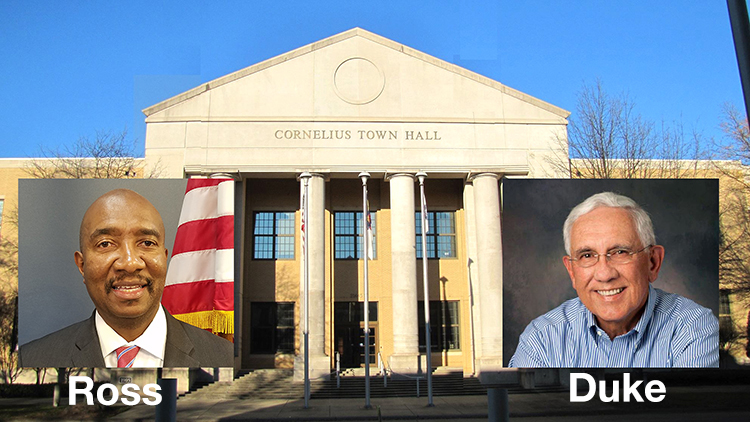
Nov. 10. By Dave Yochum. With an undetermined number of provisional ballots still to be counted, the Cornelius Town Board results at fifth and sixth place are the subject of much discussion.
Only five votes separate the fifth-place finisher—Thurman Ross, who unofficially reclaimed his seat on the five-member, non-partisan Town Board—and sixth-place finisher Jim Duke, who unofficially did not.
Ross has 1,893 votes to Duke’s 1,888 votes, or 10.63 percent vs. 10.6 percent.
To get a feel for the size of field and the difference between the top and the bottom—there were 11 candidates with the No. 1 vote-getter receiving 2,042 votes, and the last-pace finisher receiving 408 votes.
The 10th-place candidate, Ava Callender—by all accounts a serious candidate—received 1,299 votes.
But voters are the ones who decide who wins and who loses.
There are an undetermined amount of provisional ballots from Cornelius that remain to be certified and counted in the final official tallying done on Nov. 17.
According to the Mecklenburg County Board of Elections, out of 355 provisionals in all 195 voter precincts, an undetermined number are from Cornelius.
Provisionals and final absentees will be counted at “Canvass,” which will be 10 days after the general election, or Nov. 17.
“And we must accept absentee through Monday if postmarked by Election Day so it is a moving target,” said Kristin Mavromatis, public information officer for the Mecklenburg County Board of Elections.
Can they change the results?
“Yes they can change the outcome,” she said.
But how likely that is is the subject of much discussion right now.
Although Cornelius elections are non-partisan, Duke is a well-known Republican while Ross is a Democrat. Both have impressive connections with higher-ups in their parties, in Charlotte and in Raleigh.
Absentee ballots, most of which have already been counted, tend to favor Republicans. So, generally speaking, ballots that were cast in time for the official absentee close have already been counted.
Provisional ballots are more likely to be Democratic. They sometimes represent those who just moved, or thought they could register and vote on Election Day, like in early voting. Demographically, across a broad spectrum, they may represent a different level of education or a different level of access to the internet.
“Democrats pushed for Provisional Voting as it helps us. Republicans try to eliminate it all the time,” one leading Democratic party official in Charlotte said.
Stay tuned.





